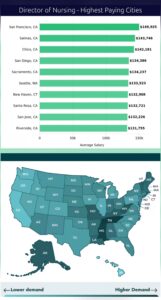If you’re pursuing an impactful and financially rewarding career in healthcare, becoming a Director of Nursing (DON) stands out as a top option. DONs lead nursing teams, shape patient care policies, and drive organizational success in hospitals, long-term care facilities, and healthcare systems nationwide. Here’s why this role is lucrative, where demand is strongest, and how to prepare.
Why it’s a lucrative, rewarding career
Leadership impact: As a DON, you influence patient outcomes, staff development, and operational efficiency across departments.
Strong compensation: DON roles typically come with high salaries, especially in regions with higher costs of living and robust healthcare industries.
Career growth: The DON position often serves as a stepping stone to executive nursing leadership roles, such as Chief Nursing Officer (CNO) or other senior administrative roles.
Job stability: Healthcare demand remains steady, with a growing need for experienced nursing leadership to manage complex patient care environments.
High Demand & High Pay
High-Paying States
States with high costs of living and robust healthcare industries generally offer the highest average salaries for Nursing Directors.
Examples include:
- California
- Massachusetts
- New York
These markets typically combine large healthcare infrastructures with competitive compensation packages, reflecting the cost of living and the demand for skilled leadership.
High-Demand Locations
Beyond state-level trends, certain metropolitan areas consistently show strong demand for DONs:
- Chicago, IL
- New York City, NY
Salary and demand data from sources like Salary.com indicate that locations with higher living costs and stronger industrial bases often pay more to attract experienced nursing leadership.
Key Factors Driving Pay
Cost of living: Higher living costs correlate with higher salaries to maintain purchasing power.
Industry size: Larger and more complex healthcare systems require seasoned leaders to oversee clinical operations.
Regional demand: Urban centers with dense patient populations and competition for experienced executives tend to offer premium compensation.
Qualifications
To become a Director of Nursing, you’ll typically need the following:
- Registered Nurse (RN) License: Your foundation is earning and maintaining an active RN license.
- Education: An advanced degree is usually required, most commonly a Master of Science in Nursing (MSN) with a focus on leadership or administration. A Doctor of Nursing Practice (DNP) or PhD can further enhance marketability.
- Experience: Significant clinical nursing experience is essential, with demonstrated leadership, management, or administrative roles.
How to Advance Your Career
1) Gain Experience
- Start as an RN to build bedside clinical expertise.
- Seek leadership opportunities early, such as charge nurse, shift supervisor, or nurse manager roles.
- Volunteer for committees or project teams that focus on quality improvement, patient safety, or operational efficiency.
2) Pursue Advanced Education
- Earn a Master of Science in Nursing (MSN) with a concentration in leadership, administration, or healthcare management.
- Consider a Doctor of Nursing Practice (DNP) or PhD for greater marketability and long-term advancement.
- Look for programs that offer practical leadership residencies or executive immersion experiences.
3) Develop Relevant Skills
- Leadership and people management: Team building, conflict resolution, performance coaching.
- Financial acumen: Budgeting, resource allocation, cost containment without compromising care.
- Compliance and policy: Regulatory knowledge, accreditation standards, patient safety initiatives.
- Data-driven decision making: Quality metrics, performance dashboards, data-informed improvement.
- Communication: Stakeholder engagement, interdepartmental collaboration, and change management.
Actionable Plan to Start Today
- Assess your current path: Are you an RN with leadership aspirations? Identify gaps in education and leadership experience.
- Map a 3–5 year plan: Target an MSN (or higher) in nursing leadership, and seek leadership roles or projects now.
- Seek mentorship: Connect with current DONs or nurse executives to learn career pathways and expectations.
- Build a compelling portfolio: Document leadership projects, quality improvements, staffing solutions, and measurable outcomes.
Conclusion
A career as a Director of Nursing offers the perfect blend of leadership impact, competitive compensation, and strong industry demand, especially in states with high costs of living and expansive healthcare ecosystems like California, Massachusetts, and New York. With the right combination of RN licensure, advanced nursing education (MSN or higher), and robust leadership experience, you can position yourself for a rewarding and highly sought-after healthcare leadership role.

